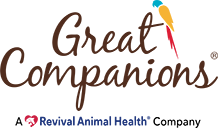
Obesity in Birds
We often hear that obesity is a major health concern for people, but did you know that obesity is one of the biggest health concerns in pet birds? Pet birds receive numerous treats, don't have to work for their food, and spend a lot of their time perching in their cage. This is a drastic difference from the exercise and healthy foods that birds in the wild receive! To reduce the chance of your pet bird becoming obese, ensure that he receives proper nutrition and stays active.
Signs of Obesity
There are a few ways to determine whether your bird is obese. The best way to tell is to look at the breast muscle. There is a bone called the keel in the middle of the breast and the breast muscles are on either side. If your bird is overweight, the keel will not be the most prominent thing in the middle of the breast, and your bird will have "cleavage."A stance that is wider than normal might also be a sign of obesity. You can also look for fat right beneath the skin (subcutaneous fat). Another clue that your bird is carrying a little too much weight is if your bird gets out of breath easily after a short period of activity. Lastly, look at the parts on your bird that are not feathered. One of these areas is at the side of the neck at the base of the jaw. If you part the feathers at this point, you can usually see the jugular vein easily. If you can't see the vein easily or there is a yellowish tint underneath the skin, your bird is probably overweight.
Diseases Related to Obesity
There are numerous diseases related to obesity, including fatty liver syndrome. Obese birds are also more susceptible to arthritis, heart disease, respiratory problems, and cancer. Make sure to weigh your bird regularly so you can monitor his weight and make any needed changes in your bird's diet and activity level.Ensure Proper Nutrition
Proper nutrition is crucial for the overall health of your bird. If your bird is receiving proper nutrition, he will have a much smaller chance of becoming obese. To ensure proper nutrition, your bird's food should have a variety of components, including dried fruits, vegetables, nuts, and seeds. Each one of these ingredients gives your bird different nutrients.Birds love seeds and sometimes seeds are the only thing that your bird will eat. If this is the case, make sure that you supplement their diet with vitamins and minerals so they can develop properly. If you don't want to worry about giving supplements, you could switch your bird to a formulated diet, which is much more nutritionally complete than a seed diet. Premier Foods provide optimal nutrition as well as probiotics and lecithin to help with fat digestion, decrease the risk of obesity, and decrease the possibility of health issues related to obesity.
Another way to control your bird's weight is by implementing a regular exercise program. Some fun, interactive toys and games will help your bird burn calories and stay in shape. Avian veterinarians will be able to give the best guidelines for the proper nutrition and exercise that your bird needs and can handle.
Discover More!
Pet Bird NutritionTracking Your Bird's Weight
Benefits of Foot Toys for Birds
The Necessity of Exercise for Birds
Return to Bird Articles


